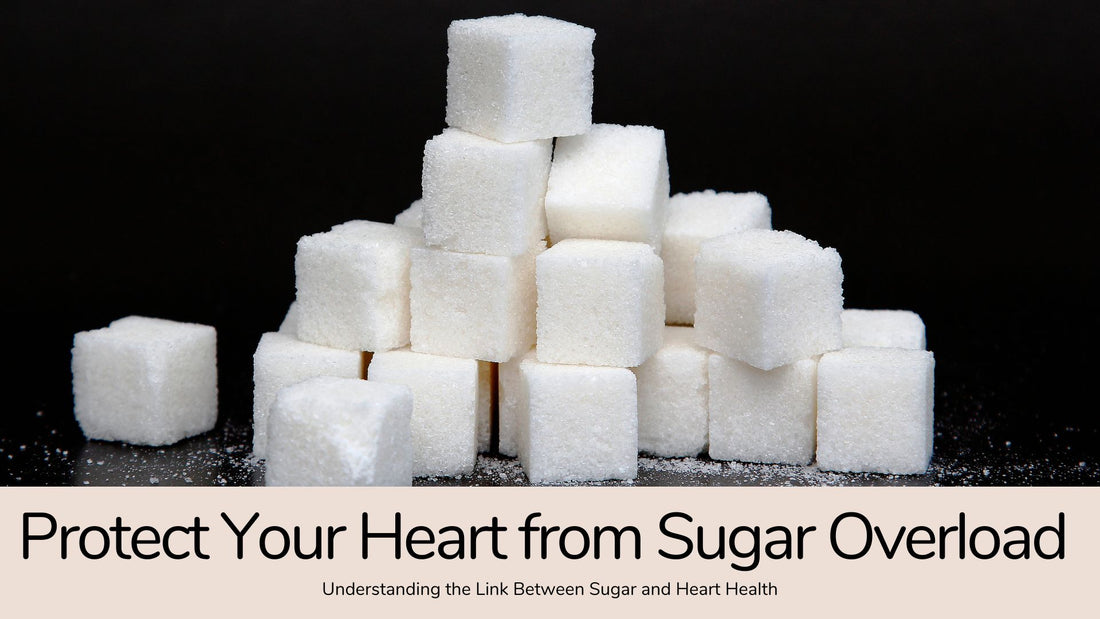In today’s world, refined sugar has become an integral part of our diets, often hidden in many of the foods and beverages we consume daily. While we may associate sugar with a quick energy boost or a sweet treat, the reality is that excessive refined sugar consumption can have devastating effects on our heart health. In this blog, we’ll explore how refined sugar acts as a "sweet poison," contributing to a range of cardiovascular issues, and why it’s crucial to monitor and reduce our sugar intake.
Understanding Refined Sugar and Its Prevalence
Refined sugar, also known as sucrose, is derived from sugar cane or sugar beets and processed to remove all naturally occurring nutrients. This type of sugar is commonly added to various foods and drinks, ranging from obvious culprits like candies and sodas to less obvious sources like sauces, bread, and even yogurt. Unlike natural sugars found in fruits and dairy, which come with fiber, vitamins, and minerals, refined sugar is nothing but empty calories with no nutritional value.
How Excess Refined Sugar Damages Your Heart
The link between excessive refined sugar intake and heart health is well-documented. Here’s how it wreaks havoc on your cardiovascular system:
-
Increased Risk of Obesity
- High sugar consumption leads to an excess of calories, which can contribute to weight gain and obesity. Obesity is a major risk factor for heart disease, as it can lead to conditions like high blood pressure, elevated cholesterol levels, and insulin resistance—all of which strain the heart and increase the likelihood of heart attacks and strokes.
- High sugar consumption leads to an excess of calories, which can contribute to weight gain and obesity. Obesity is a major risk factor for heart disease, as it can lead to conditions like high blood pressure, elevated cholesterol levels, and insulin resistance—all of which strain the heart and increase the likelihood of heart attacks and strokes.
-
Elevated Blood Pressure
- Consuming large amounts of sugar, especially in the form of sugary drinks, has been linked to increased blood pressure levels. High blood pressure, or hypertension, forces the heart to work harder to pump blood, which over time can damage the arteries and lead to heart disease.
- Consuming large amounts of sugar, especially in the form of sugary drinks, has been linked to increased blood pressure levels. High blood pressure, or hypertension, forces the heart to work harder to pump blood, which over time can damage the arteries and lead to heart disease.
-
Increased Triglyceride Levels
- Refined sugar is quickly absorbed by the body and converted into glucose. Any excess glucose that isn’t used for energy is stored as fat in the body, particularly in the form of triglycerides. High levels of triglycerides in the blood are a significant risk factor for atherosclerosis (hardening of the arteries), which can lead to heart attacks and strokes.
- Refined sugar is quickly absorbed by the body and converted into glucose. Any excess glucose that isn’t used for energy is stored as fat in the body, particularly in the form of triglycerides. High levels of triglycerides in the blood are a significant risk factor for atherosclerosis (hardening of the arteries), which can lead to heart attacks and strokes.
-
Insulin Resistance and Type 2 Diabetes
- Overconsumption of refined sugar can lead to insulin resistance, where the body’s cells become less responsive to insulin. This condition can progress to type 2 diabetes, a major risk factor for heart disease. People with diabetes are twice as likely to suffer from heart disease or stroke as those without the condition.
- Overconsumption of refined sugar can lead to insulin resistance, where the body’s cells become less responsive to insulin. This condition can progress to type 2 diabetes, a major risk factor for heart disease. People with diabetes are twice as likely to suffer from heart disease or stroke as those without the condition.
-
Chronic Inflammation
- Excessive intake of refined sugar can trigger chronic inflammation, which is a key contributor to the development of heart disease. Inflammation can damage the inner linings of the arteries, promoting the formation of plaques that can block blood flow and lead to heart attacks.
- Excessive intake of refined sugar can trigger chronic inflammation, which is a key contributor to the development of heart disease. Inflammation can damage the inner linings of the arteries, promoting the formation of plaques that can block blood flow and lead to heart attacks.
-
Impact on Cholesterol Levels
- High sugar intake has been associated with an unfavorable lipid profile, including reduced levels of "good" HDL cholesterol and increased levels of "bad" LDL cholesterol. This imbalance further accelerates the buildup of fatty deposits in the arteries, increasing the risk of cardiovascular diseases.
The Hidden Sugars in Your Diet
One of the most concerning aspects of refined sugar is how it sneaks into our diets. Many processed foods and beverages contain hidden sugars, making it easy to consume more than the recommended daily amount without realizing it. Some common sources of hidden sugar include:
- Soft drinks and energy drinks
- Breakfast cereals
- Flavored yogurts
- Condiments like ketchup and salad dressings
- Baked goods like bread, muffins, and pastries
- Snack bars and granola bars
Reading nutrition labels carefully and being aware of alternative names for sugar, such as high-fructose corn syrup, dextrose, and sucrose, can help you identify hidden sugars and make healthier choices.
Practical Tips to Reduce Refined Sugar Intake
Given the adverse effects of refined sugar on heart health, it’s important to take steps to reduce your consumption. Here are some practical tips:
-
Opt for Whole Foods:
- Choose whole, unprocessed foods like fruits, vegetables, lean proteins, and whole grains, which are naturally low in added sugars.
- Choose whole, unprocessed foods like fruits, vegetables, lean proteins, and whole grains, which are naturally low in added sugars.
-
Limit Sugary Beverages:
- Replace sugary drinks with water, herbal teas, or sparkling water with a splash of lemon or lime for flavor.
- Replace sugary drinks with water, herbal teas, or sparkling water with a splash of lemon or lime for flavor.
-
Read Labels:
- Check food labels for added sugars and choose products with little to no added sugar. Be aware of the many names sugar can go by, such as fructose, maltose, and syrup.
- Check food labels for added sugars and choose products with little to no added sugar. Be aware of the many names sugar can go by, such as fructose, maltose, and syrup.
-
Cook at Home:
- Preparing meals at home allows you to control the ingredients and avoid hidden sugars often found in restaurant or pre-packaged foods.
- Preparing meals at home allows you to control the ingredients and avoid hidden sugars often found in restaurant or pre-packaged foods.
-
Gradually Reduce Sugar:
- If you have a sweet tooth, try gradually reducing the amount of sugar you add to your coffee, tea, or recipes to help your taste buds adjust.
- If you have a sweet tooth, try gradually reducing the amount of sugar you add to your coffee, tea, or recipes to help your taste buds adjust.
-
Choose Natural Sweeteners:
- When you need a sweetener, consider using small amounts of natural options like honey, maple syrup, or stevia, but be mindful of their quantities as well.
- When you need a sweetener, consider using small amounts of natural options like honey, maple syrup, or stevia, but be mindful of their quantities as well.
-
Increase Fiber Intake:
- Foods high in fiber can help regulate blood sugar levels and reduce sugar cravings. Include plenty of fruits, vegetables, legumes, and whole grains in your diet.
Conclusion: Protect Your Heart by Cutting Down on Sugar
While sugar may be sweet to the taste, its effects on your heart can be bitter. Excess refined sugar consumption is a significant risk factor for heart disease, leading to obesity, high blood pressure, inflammation, and other cardiovascular issues. By being mindful of your sugar intake and making healthier dietary choices, you can protect your heart and improve your overall health. Remember, it’s not about completely eliminating sugar, but rather enjoying it in moderation and being aware of where it might be hiding in your diet.
Your heart is worth the effort—start making small changes today to reduce your refined sugar intake and safeguard your cardiovascular health for years to come.

